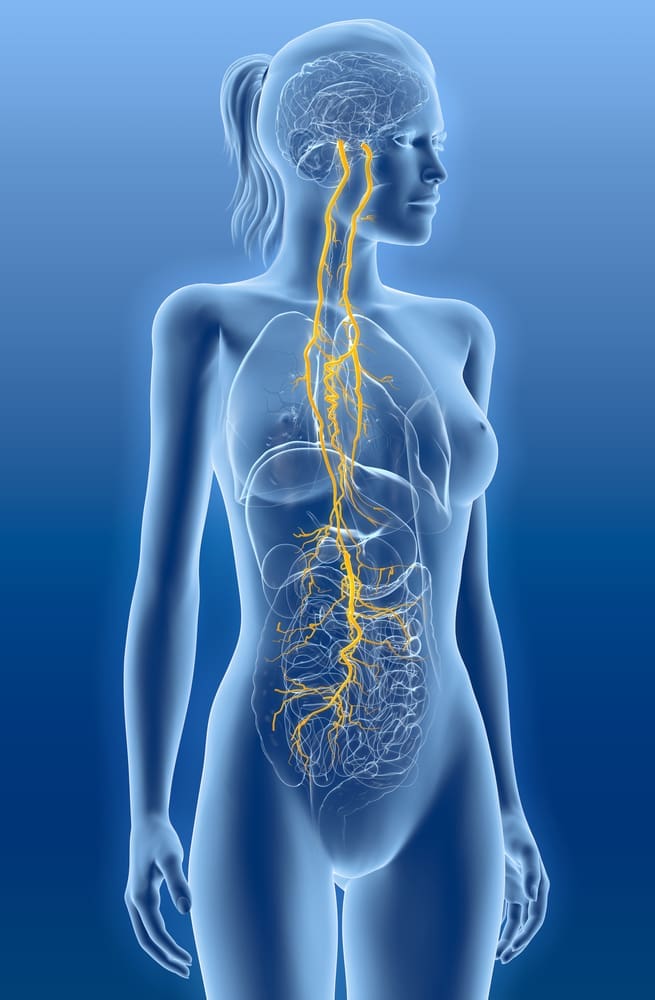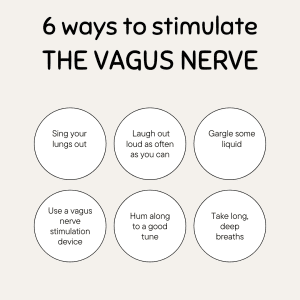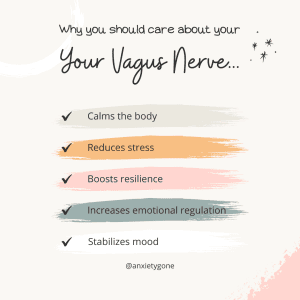Full Disclosure: Clicking on these links could mean a tiny commission for me, at no extra cost to you.
If you’ve ever wished there was a “calm down” button for your brain, you’re going to love hearing that you already have one, only it’s on your neck and it’s called your vagus nerve. The vagus nerve and anxiety have a strong connection that is both fascinating and incredibly effective, especially during those moments of high stress or full-blown anxiety attacks. Whether you’re curious about how to activate the vagus nerve, vagus nerve stimulation exercises or how vagus nerve stimulation devices work, you’re just a skip and a hummmm away from taking advantage of this natural, science-backed anxiety relief.
What Is the Vagus Nerve, Anyway?
Think of the vagus nerve as your body’s backstage manager; quietly running the show, keeping everything from your heartbeat to your digestion in sync. It’s the longest cranial nerve in your body, stretching from your brainstem down through your chest and into your abdomen, connecting with nearly every major organ along the way. But what makes it especially fascinating is its role in regulating your parasympathetic nervous system. This is the part of your nervous system responsible for rest, recovery, and (yes!) emotional regulation.
When we talk about the vagus nerve and anxiety, we’re really talking about how this powerful nerve in your neck area can signal your body to slow down, breathe deeply and put an end to that stress spiral. It’s why practices like vagus nerve stimulation exercises and even vagus nerve stimulation devices have become hot topics in the world of mental health and wellness. Understanding this connection is essentially unlocking a secret (and science-backed) remedy for anxiety—and who doesn’t need more of that?
Fast, Affordable Therapy and Medication
Medication and therapy work better together — and Hims/Hers make getting support simple. Connect with licensed providers online, receive personalized treatment plans, and access medication — all from the comfort of home. No long waits, no stress — just expert care made easy.
The Vagus Nerve and Anxiety Connection
The first step to taking advantage of the vagus nerve and anxiety relief connection is understanding what it even is. When your vagus nerve is functioning well, it helps keep your nervous system balanced, so it can signal to your body when it’s safe to relax. But when it’s underactive or overstimulated? That’s when anxious thoughts, racing heartbeats, and tense muscles can take centre stage.
The vagus nerve plays a direct role in activating your body’s calming response. A healthy, responsive vagus nerve increases something called vagal tone, which is linked to emotional regulation, better stress management, improved mood and an abundance of additional health benefits. Low vagal tone, on the other hand, has been associated with chronic anxiety, depression and even gut issues.
That’s why vagus nerve stimulation, whether through breathwork, cold exposure, gentle yoga, or even high-tech vagus nerve stimulation devices, has become such a buzz in the mental health space. By stimulating (and increasing) your vagus nerve, you can activate a sense of calm and relief quickly and effectively, especially when paired with anxiety tools like our soothing fidget rings.
The Soothing Effects of Vagus Nerve Stimulation for Anxiety (and Beyond)
If you’ve ever wished for a way to calm your nervous system without meds or a massive lifestyle overhaul, vagus nerve stimulation is your new go-to. Activating the vagus nerve helps with anxiety while also unleashing a ripple effect on your the rest of your mental health and overall wellness.
Here are just a few science-backed benefits of vagus nerve stimulation:
-
Reduces anxiety and stress: By encouraging your body’s natural “rest and digest” mode, vagus nerve stimulation can lower cortisol levels and soothe an overactive mind.
-
Improves mood: A healthy vagus nerve has been linked to better emotional regulation and increased resilience to stress—two essential ingredients for mental health.
-
Supports heart and gut health: Better vagal tone is associated with a calmer heart rate and improved digestion, both of which are often disrupted by chronic anxiety.
-
Boosts sleep quality: Calming the nervous system can help you fall asleep faster and stay asleep longer—no sheep counting required.
-
May ease symptoms of depression and PTSD: Emerging research suggests that vagus nerve stimulation devices could be a promising complementary therapy for more serious mental health conditions.
What makes it even better? You don’t need expensive equipment or clinical treatments to start seeing results. Simple vagus nerve stimulation exercises, like humming, cold splashes, or even mindful breathing, can help train your body to stay calm when life gets messy.
What Throws Off Your Vagus Nerve? Triggers to Watch For
While your vagus nerve is pretty resilient, modern life has a sneaky way of messing with its flow. If you’ve ever felt like your anxiety shows up uninvited (and stays way too long) there could be something quietly irritating your vagus nerve behind the scenes.
Here are some common culprits that can disrupt healthy vagal function:
-
Chronic stress: No surprise here. Ongoing stress floods your system with cortisol, making it harder for your vagus nerve to switch your body back into a relaxed state.
-
Poor sleep habits: Skimping on rest doesn’t just mess with your mood (it can actually lower your vagal tone, making you more reactive to everyday stressors).
-
Inflammation and poor gut health: The gut-brain connection is real, and since the vagus nerve runs straight through your digestive system, issues like bloating, food sensitivities, or IBS can impact its function.
-
Negative thought loops and unresolved trauma: Our thoughts directly affect our nervous system. Replaying stressful scenarios or carrying unprocessed emotions can keep the vagus nerve stuck in high-alert mode.
-
Lack of movement or connection: Sedentary lifestyles and social isolation can weaken vagal activity over time. Both physical activity and meaningful human connection are known to help regulate the nervous system.
The good news? Once you know what’s throwing off your vagus nerve, you can start making gentle, supportive changes. From vagus nerve stimulation exercises to mindful habits and calming tools (like our bestselling anxiety rings for women), small daily practices can go a long way in restoring your body’s natural sense of balance and calm.
Signs Your Vagus Nerve Might Be Out of Whack
Not sure if your vagus nerve needs some TLC? Your body might already be sending you subtle (and not-so-subtle) signals. Because this nerve is tied to so many key functions, such as breathing, heart rate, digestion, mood, it can impact your well-being in surprising ways when it’s not firing properly.
Common signs your vagus nerve may be underactive or dysregulated include:
-
Chronic anxiety or feeling “on edge” all the time
-
Digestive issues like bloating, constipation, or poor appetite
-
Difficulty calming down after stress or feeling emotionally reactive
-
Racing heart rate or shallow breathing, even when you’re at rest
-
Brain fog or low energy, especially after eating
-
Trouble sleeping or waking up feeling unrested
-
Feeling disconnected from your body or emotionally numb
If these sound familiar, don’t panic; there’s a lot you can do to reboot your vagus nerve and get your nervous system back into a calmer, more grounded state. (Hint: think vagus nerve stimulation exercises, mindful breathing, and yes, even that gold fidget ring you’ve had your eye on.)
Where Is The Vagus Nerve Location?
Your vagus nerve isn’t exactly something you can easily poke or prod. After all, it starts at the base of your brain near the brainstem and winds its way down both sides of your neck, through your chest, and into your abdomen. Along the way, it touches nearly every major organ, including your heart, lungs, stomach, liver and intestines, all while quietly regulating things like digestion, heartbeat and emotional responses.
So, can you feel your vagus nerve? Not directly. But you can activate it through areas it passes through, like your throat, chest, and diaphragm, using gentle stimulation. That’s why techniques like deep belly breathing, humming, cold exposure, or even lightly massaging your neck can help trigger a vagus nerve response. These practices send calming signals to your nervous system, helping to reduce anxiety and bring your body back into a state of balance.
Easy Vagus Nerve Stimulation Exercises You Can Do at Home
Not sure if your vagus nerve needs some TLC? Your body is likely already sending you subtle (and not-so-subtle) signals. Because this nerve is tied to so many key functions, such as breathing, heart rate, digestion and mood, it can impact your health and overall wellbeing in surprising ways when it’s not firing properly.
Here are some of the easiest ways to activate the vagus nerve naturally:
1. Deep Belly Breathing
Slow, diaphragmatic breathing is like a hug for your nervous system. Inhale through your nose for 4 seconds, hold for 4, exhale through your mouth for 6–8 seconds. Repeat for a few minutes. You’ll feel the shift.
Bonus Tip: Our readers can try an entire month of breathwork courses and classes for free.
2. Humming or Chanting
Sound vibrations in your throat gently stimulate the vagus nerve. Try humming your favourite tune, chanting “om,” or singing in the shower (bonus: it boosts your mood, too).
Singing and gargling also help calm your vagus nerve.
3. Cold Exposure
Splashing cold water on your face or ending your shower with 30 seconds of cold water is also great for triggering a vagus nerve reset. It sounds intense, but it’s surprisingly energizing and calming. Ice cubes on your pulse points also work wonders too (my personal go-to when I’m having panic attacks).
4. Gentle Neck or Chest Massage
A soft massage around the carotid sinus area (sides of the neck) or over your chest can activate vagal pathways. Use calming essential oils like lavender or peppermint for an extra boost of relaxation.
5. Breath + Hold (Box Breathing)
Inhale for 4 seconds, hold for 4, exhale for 4, hold for 4—and repeat. This therapist-favourite breathing technique is loved for its anxiety-calming effects and how easy it is to remember and implement in times of need.
6. Legs Up the Wall Pose
Resting with your legs up against a wall for 5–10 minutes helps reset your parasympathetic system and calm your vagus nerve. It’s also great for tired feet and busy minds.
7. Mindful Movement
Yoga, tai chi, or even a slow walk outdoors can improve vagal tone over time. Combine movement with breath and presence, and you’re golden.
Bonus Tip: Get 50% off your online membership at Yoga Download.
Effectively Stimulate Your Vagus Nerve
Truvaga is a small but mighty handheld device that uses gentle vagus nerve stimulation to help ease anxiety, reduce stress and improve your sleep. Just 2 minutes a day, this award-winning vagus nerve stimulation device is designed to calm your nervous system — anytime, anywhere.
Final Thoughts on Vagus Nerve Stimulation and Anxiety
If you’ve ever felt instantly soothed by a long “ommm” during yoga or noticed how a cold splash of water resets your mood, you’ve already experienced the benefits of vagus nerve stimulation, no anatomy degree required. Understanding the link between the vagus nerve and anxiety is like discovering a hidden switch for calm that’s been within you all along. With simple tools like vagus nerve stimulation exercises, mindful movement and soothing self-care items like our fidget rings and anxiety gift sets, you can start supporting your nervous system naturally.
Additional Resources
At Anxiety Gone, we believe in healing together. We’ve partnered with trusted wellness organizations to bring you the most effective tools, insights, and support. Some links may earn us a commission — always at no extra cost to you.
Join The Club
Connect with our private self-care community for daily support, exclusive tips, and inspiration. Join us today
Talk Therapy
Get matched with licensed therapists online through BetterHelp and begin your healing today. Start now
Hims/Hers
Receive personalized, affordable mental health care + medication from home — no insurance required. Learn more
Mental Health, Right to your Inbox
Subscribe to our newsletter for a place to rest your mental health and find ways to support your journey. Sign up
Emotional Freedom Technique
Tap your way to calm with scientifically backed stress relief. Our readers receive a 14-day free trial! Try EFT now
Mindfulness App
Access 2,000+ guided practices to support your mental health wherever you are + exclusive discount when you upgrade Try it
Online Breathwork
Experience calm and reset your nervous system with guided sessions and receive your first month free . Get started
Find a Helpline
If you need immediate support, visit our directory to find help near you. See helplines












